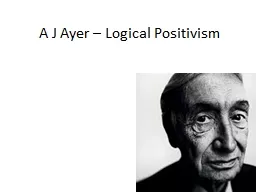PDF-itique of Positivism !"THE CRITIQUE OF POSITIVISM! Russell Keat+ 1.
Author : olivia-moreira | Published Date : 2015-09-28
University of Lancaster in April 1980 A later version with the same title was published as Chapter 1 of The Politics of itique of Positivism examination of Comtean
Presentation Embed Code
Download Presentation
Download Presentation The PPT/PDF document "itique of Positivism !"THE CRITIQUE OF P..." is the property of its rightful owner. Permission is granted to download and print the materials on this website for personal, non-commercial use only, and to display it on your personal computer provided you do not modify the materials and that you retain all copyright notices contained in the materials. By downloading content from our website, you accept the terms of this agreement.
itique of Positivism !"THE CRITIQUE OF POSITIVISM! Russell Keat+ 1.: Transcript
Download Rules Of Document
"itique of Positivism !"THE CRITIQUE OF POSITIVISM! Russell Keat+ 1."The content belongs to its owner. You may download and print it for personal use, without modification, and keep all copyright notices. By downloading, you agree to these terms.
Related Documents














